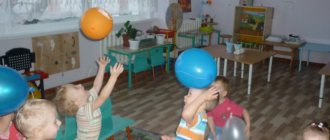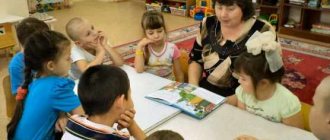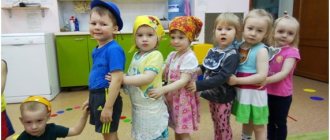The child was left for the second year in the preparatory group of the kindergarten. What to do?
It often happens that a child graduates from kindergarten at 6 years old. There's still a year left until school. And where to conduct it is unclear. Either go back to the preparatory group, or to grade zero, or even to school. Is it legal to leave a child in kindergarten for the second year and what should parents pay attention to in this case?
Useful Mela newsletter twice a week: Tuesday and Friday
SUBSCRIBE
Question.
The child is 6 years old, he graduated from the preparatory group of the kindergarten, but the neurologist insisted that the boy is not yet ready for school. There are seven such children in our kindergarten. The head decides to send them back to the preparatory group. I am worried that the children will not be adequately prepared for school (we have already paid for a speech therapist). Is this considered a violation?
Answer:
Only children who, on September 1 of the current year, will be at least 6 years and 6 months and no more than 8 years old are accepted into the first grades of Moscow schools.
The decision to admit a child under 6 years and 6 months to school is made on an individual basis and only after the child has been diagnosed by a speech therapist and psychologist.
The practice of a child spending two years in the preparatory group of a kindergarten is quite common. In some cases, this is due to the fact that the child went to kindergarten before the age of 3, in others, due to the parents’ decision to postpone school and let the child play enough, grow up and mature psychologically.
Neuropsychologists and neurophysiologists say that the development of mental functions to the required level occurs differently in all children. And some children at 6.5 years old are already ready to go to first grade, while others, despite their well-developed intellect and broad outlook, still “play with dolls” and are not ready to sit through a full lesson even at full 7. And there is nothing in this scary.
The second year of pre-kindergarten is just another year of kindergarten.
Depending on how the system is built in a given preschool institution, the child will either remain with his old teacher, if each age group has its own preschool teacher, or will end up with a new one, if the teacher takes a younger group and leads it before school.
In any case, throughout the year the child will also be involved in all developmental activities in the program according to his age.
You can get acquainted with the program of developmental classes from the senior teacher of the preschool institution, and also, as a rule, on the official website of the school.
In addition, parents have the opportunity to independently choose additional classes for their child to prepare for school through the government services portal - any educational institution operates such clubs, both paid and free. There are also classes for preschoolers there.
Instructions for registering for school preparation or other clubs:
Step 1:
Go to mos.ru or the government services portal in your region.
Step 2:
In the catalogue.
Step 3:
Select “Enroll in clubs, sports sections, creativity houses”
Step 4:
Search for “Introduction to school life”
Step 5:
Select a group that suits your location.
Preschool institutions are part of the educational complex, and often elementary school teachers organize groups for preparation and adaptation to school on the territory of the kindergarten or offer to attend “preparatory classes” on the school grounds. Usually this is 1.5-2 hours twice a week in the afternoon (after a quiet hour in kindergarten).
The decision about a child’s readiness for school and the maturity of all his functions is not made by a neurologist. To do this, you need to undergo a speech therapist and a child psychologist. If parents have doubts about the specialist’s conclusion or want to get additional advice, they can seek specialized help from:
- GPPC (City Psychological and Pedagogical Center);
- Central Psychological-Medical-Pedagogical Commission;
- FRC PMPC (Federal Resource Center PMPC, a structural division of the Center for the Protection of the Rights and Interests of Children).
Anna Poilova, lawyer:
Parents are the legal representatives of their children and act in defense of their rights and interests in relations with any individuals and legal entities (Article 64 of the Family Code). It is the parent who independently decides whether the child should go to school or stay in kindergarten.
All issues related to the upbringing and education of children are resolved by parents by mutual consent, based on the interests of the children and taking into account the opinions of the children.
Whether a child attends school or stays for another year in kindergarten is decided only by the parent or other legal representative of the child, taking into account psychological and pedagogical examination, the conclusion of a neurologist, speech therapist and other specialists. The head of the kindergarten cannot make such a decision.
In case of a controversial situation, the child’s legal representative always has the right to contact the administration of the educational institution or the following departments:
- Courts of general jurisdiction;
- Prosecutor's Office;
- Department of Education and Science of the City of Moscow.
Ask your question to “Mel”, and the editors will find someone who can answer it. Write to our social networks - we read all messages on pages on Facebook, VKontakte and Odnoklassniki. You can also write to us on Instagram. Answers will be published in order in the “Question - Answer” section. By the way, we do not reveal names, so questions can be anything (feel free!).
Photo: Shutterstock/OlegRi
Kindergarten: does a hyperactive child need it?
It is highly desirable that a hyperdynamic preschooler attend some preschool institution. The home for a hyperdynamic child is cramped; he needs communication and other varied experiences. He is sociable, easily gets along with children and adults, active, non-offensive and enterprising. It is created for the team. Keeping it at home after three years unless absolutely necessary is completely inappropriate.
Sometimes (since, as we know, hyperdynamic syndrome is often not the only clinical manifestation of MMD - minimal brain dysfunction) parents reason like this:
“He’s so weak and nervous.” He had diathesis and stuttered, and he still pees sometimes. All sort of twitchy. Once he plays with someone and gets mad, you won’t be able to calm him down until the evening. If you send him to kindergarten, it will be even worse. It’s better for him to sit at home until school, get stronger, and then immediately go to first grade.
This reasoning is fundamentally incorrect. The fact is that a child entering any mass child care institution experiences three types of stress.
The first is immunological stress. Simply put, as many children as there are in the group (class, school) immediately begin to sneeze and cough on it. If the child's immune system is not very strong (and in children with MMD this is most often the case), it takes some time for it to adapt to the situation. This is why most children who first enter kindergarten or school begin to regularly suffer from colds. Normally, after about six months the situation levels out - the immune system has adapted to the available antigens. If a child is taken from kindergarten after the first or second illness, and sent back the next year, everything repeats all over again.
The second stress is social stress. A child who is used to being the center of attention in the family, the object of care for adults, suddenly finds himself in a situation where his wishes are not very likely to be taken into account, where everything is done on command, and other children have exactly the same rights as he himself. . If in the family where the child is growing up there are other children, his brothers and sisters, then all this passes almost painlessly. But if the child is the only one, then he faces serious problems.
In addition, only “in society” can a system of social roles be built. Who am I - a leader or a follower? What should I do if I want to make friends with this boy? What should I do if this girl took my favorite toy? How to attract the attention of other children? How, on the contrary, can you stay alone and make sure they don’t pester you? All these issues are resolved only in the practice of daily social life and nothing else.
A very socially interesting place is a kindergarten toilet, a smaller copy of a school toilet. Here very important issues are resolved, dates are arranged, relationships are sorted out. For a boy who has not gone through the “school” of the kindergarten toilet, the school toilet itself turns out to be an unexpected and often very unpleasant discovery.
The third stress is the actual school, educational stress that awaits any first-grader. Sit in one place for 45 minutes, answer only on command (even if you know the answer better than others), don’t run during recess, watch the teacher all the time, keep up with assignments, and think, think, think all the time...
So, parents who do not send their child to kindergarten, but wait at home until he “gets stronger,” doom the child to a very difficult situation when all three stresses (remember: immunological, social and educational) fall on him at the same time. And then the child either begins to get desperately sick, or one morning declares: “I won’t go to this school of yours anymore!” So what should parents do then?
So it’s better to immediately make sure that all these stresses are separated in space and time. If a child was sent to kindergarten and had his share of colds at the age of five (the immune system has adapted to constant “sneezing”), the social status is determined at the age of six (I am not a leader, but I can successfully entertain those around me, I cannot repel a direct attack , but I can easily redirect the aggression directed at me - yes, yes, don’t be surprised, it’s precisely this level of complexity that six-year-old children solve social problems), then at seven years old such a child will calmly go to school and quite successfully survive the educational situation itself.
How to choose a school and teacher?
This can be done in different ways. I’ll take the liberty of offering one of the most uncommon, but very effective.
You go to the school(s) where you plan to send your child and watch the fourth graders come out into the lobby after school ends. Among the children who ran out, you notice three or four disheveled, agile as mercury, with an open briefcase and hands smeared with ink. If at the same time they scream like crazy and speak, choking and dancing on the spot, then you can be sure that this is the hyperdynamic contingent of this class. Next, you notice which of the children you are interested in meet. Approach your mother or grandmother and say something like the following:
- Hello! Excuse me, please, my son is entering first grade next year. Perhaps it will end up with your teacher. In some ways he resembles your boy (girl). I'm very worried about him. Tell me, how did your relationship with the teacher develop these three years?
The following are possible options. If you are told a tragic story about the struggle for academic performance, notebooks and diaries dotted with red, standing in corners and scolding at parent-teacher meetings, then, regardless of the “official” reputation of this teacher, you should seriously think about it before giving your hyperdynamic child to her class.
If they tell you that there were a lot of problems, but the teacher somehow managed to find an approach to the child, always found something to praise him for, and as a result, he now makes fewer mistakes, and has become more attentive to his studies, and I always enjoy going to school—you can rest assured that this is exactly what you need.
Activities, games, holidays with children 6-7 years old
Showing publications 1-10 of 133981. All sections | Preparatory group
New
Photo
The best
Summary of educational activities with children of senior preschool age “Adventures of Geologists” Olga Yuryevna Mukhamedzhanova, music director, municipal budgetary preschool educational institution “Child Development Center - Kindergarten No. 140”
urban district of Samara Goal: expanding the horizons of preschoolers through various types of activities and getting to know…
Summary of a lesson on experimental activities for children 5–7 years old on the topic “Dynamo” Summary of a lesson on experimental activities for children 5–7 years old. Topic: "Dynamo"
.
The goal is to introduce children to the concept of “dynamo
. Objectives: to clarify children’s ideas about the importance of electricity for people; consolidate the ability to use an electricity sensor...





